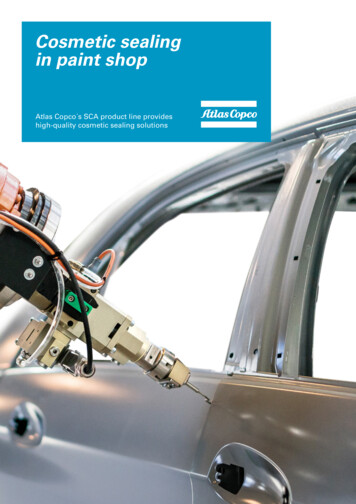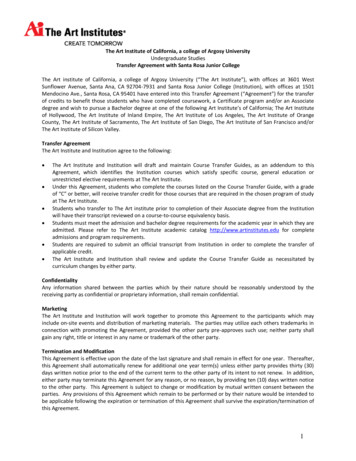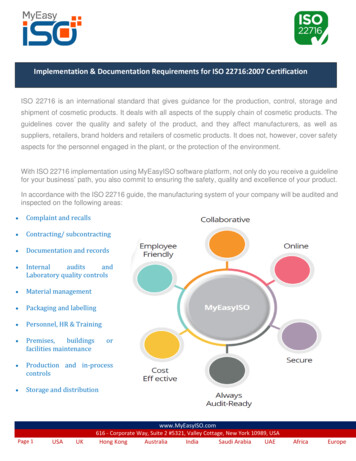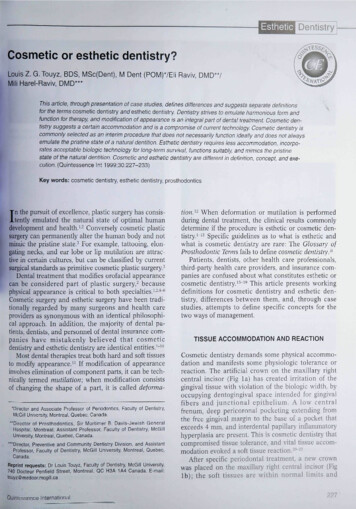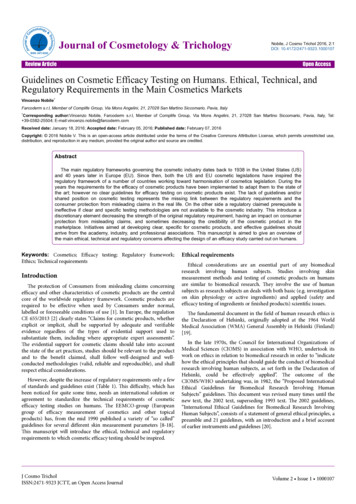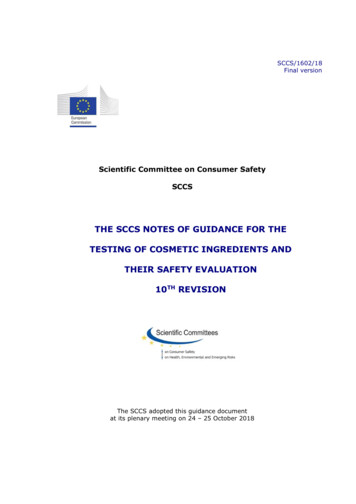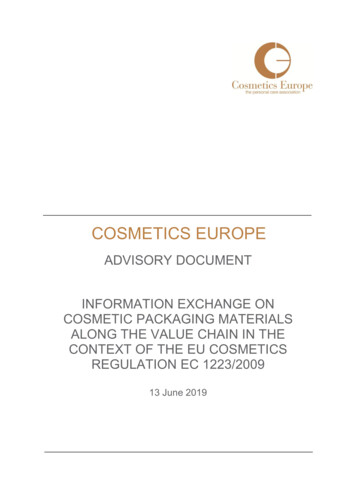
Transcription
NC Board of Cosmetic Art ExaminersFree Continuing Education Class forCosmetologistsApril 2022The Board has collected the following material for licensed cosmetologists to use as a free CE course.Reading this material and practicing the steps for safe services on a mannequin or model should take 8hours and count for 8 hours of continuing education. Only models within the licensee householdshould be used during the shelter-in-place order.After completing this course sign and keep this page for a record of completion.The material in this course includes: Board Regulationso Shop operationso Infection control standardso Prohibited practiceso Penalties for rule violationso Inspection gradingHandwashing procedureBlood exposure procedureso Self cuto ClientInfection control procedures beginning and end of dayBasic haircut procedure with infection controlLicensee SignatureDate and Time of Course CompletionAddress of Course CompletionApril 2020nccosmo@nccosmeticarts.com1NC Board of Cosmetic Art Examiners – FREE CE Course
Section One – Shop, Infection Control, and Prohibited PracticeRegulations21 NCAC 14H .0201APPLICATION FOR SHOP LICENSE(a) Rules in this Subchapter apply to all cosmetic art shops making initial application to operate a cosmeticart shop after the effective date of these Rules.(b) Shops licensed prior to March 1, 2012 may choose to comply with Rules .0202, .0203(c), .0204 and.0301 of this Subchapter.(c) Shops licensed prior to March 1, 2012 must comply with Rules .0201, .0203(a)-(b), .0302-.0304 andSections .0400 and .0500 of this Subchapter.(d) Shops licensed prior to March 1, 2012 that make any structural changes must come into compliancewith all rules in this Subchapter.(e) Persons desiring to open a cosmetic art shop in the State of North Carolina shall make application tothe North Carolina State Board of Cosmetic Art Examiner on the Board's application form. Personsdesiring to change ownership of a cosmetic art shop, relocate or reopen a shop which has been closedmore than 90 days shall make application to the North Carolina State Board of Cosmetic Art Examiner onthe Board's application form.21 NCAC 14H .0203NEWLY ESTABLISHED SHOPS(a) A cosmetic art shop shall be separate and apart from any building or room used for any other businessor purpose, separated by a solid wall of at least seven feet in height and must have a separate outsideentrance.(b) A newly established cosmetic art shop, shall be separate and apart from any building or room usedfor living, dining or sleeping and shall be separate and apart from any other room used for any otherpurpose by a solid wall of ceiling height, making separate and apart rooms used for a cosmetic art shop.All entrances to the cosmetic art shop shall be through solid, full length doors installed in solid walls ofceiling height.(c) A residential cosmetic art shop shall furnish bathroom facilities separate and apart from the residence.(d) An entrance to a cosmetic art shop from a passageway, walkway or mall area used only for access tothe shop, or to the shop and other businesses, may be open.21 NCAC 14H .0204DIMENSIONS WITHIN COSMETIC ART SHOPSWithin the clinic area each shop shall maintain no less than the following working distances:(1)48 inches of space from the center to the center of each styling chair, esthetics table ormanicuring table;(2)24 inches from the center of the chair forward;(3)48 inches from the backrest behind the chair to any other styling chair, esthetics table ormanicuring table; and(4)at least 30 inches of space from the back of each styling chair, esthetics table ormanicuring table to the wall of the shop.21 NCAC 14H .0301WATERCosmetic art shops shall have a sink with hot and cold running water in the shop, separate from restrooms.April 2020nccosmo@nccosmeticarts.com2NC Board of Cosmetic Art Examiners – FREE CE Course
21 NCAC 14H .0302VENTILATION AND LIGHT(a) Ventilation shall be provided at all times in the clinic areas when patrons are serviced in all cosmeticart shops and there must be a continuous exchange of air.(b) Light shall be provided in the service area of a cosmetic art shop.(c) All cosmetic art shops must adhere to any federal, State and local government regulation or ordinanceregarding fire safety codes, plumbing and electrical work.21 NCAC 14H .0303BATHROOM FACILITIES(a) Toilet and hand washing facilities consisting of at least one commode and one hand washing sink withrunning water, liquid soap and individual clean towels or hand air dryer shall be accessible to eachcosmetic art shop.(b) Shops with an initial licensure date on or after March 1, 2012 shall have toilet and hand washingfacilities in the bathroom as required in Paragraph (a) of this Rule.21 NCAC 14H .0304EQUIPMENTCosmetic art shops shall maintain equipment and supplies to safely perform any cosmetic art serviceoffered in the shop.21 NCAC 14H .0401LICENSEES AND STUDENTS(a) For purposes of this Section, sanitation, as described in G.S. 88B, is defined as "infection control."(b) Notwithstanding Rule .0201 in this Subchapter, this Rule applies to licensees and students in practicein cosmetic art schools and shops. Each licensee and student shall wash his or her hands with soap andwater or use of a 70 percent or greater alcohol-based hand sanitizer immediately before and after servingeach client.(c) Each licensee and student shall wear clean garments and shoes while serving patrons.(d) Licensees or students shall not use or possess in a cosmetic art school or shop any of the following:(1)Methyl Methacrylate Liquid Monomer, a.k.a. MMA;(2)razor-type callus shavers designed and intended to cut growths of skin including skin tags,corns, and calluses;(3)FDA rated Class III devices;(4)carbolic acid (phenol) over two percent strength;(5)animals including insects, fish, amphibians, reptiles, birds, or non-human mammals toperform any service; or(6)a variable speed electrical nail file unless it has been designed for use on a natural nail.(e) A licensee or student shall not:(1)use any product, implement, or piece of equipment in any manner other than theproduct's, implement's, or equipment's intended use as described or detailed by themanufacturer;(2)treat any medical condition unless referred by a physician;(3)provide any service unless trained prior to performing the service;(4)perform services on a client if the licensee has reason to believe the client has any of thefollowing:(A)fungus, lice, or nits;April 2020nccosmo@nccosmeticarts.com3NC Board of Cosmetic Art Examiners – FREE CE Course
(B)an inflamed, infected, broken, raised, or swollen skin or nail tissue in the area tobe worked on; or(C)an open wound or sore in the area to be worked on;(5)alter or duplicate a license issued by the Board;(6)advertise or solicit clients in any form of communication in a manner that is false ormisleading;(7)use any FDA rated Class II device without the documented supervision of a licensedphysician;(8)use any product that will penetrate the dermis;(9)make any statement to a member of the public, either verbally or in writing, stating orimplying any action is required or forbidden by Board rules when such action is notrequired or forbidden by Board rules. A violation of this prohibition is consideredpracticing or attempting to practice by fraudulent misrepresentation is set forth in 21NCAC 14P .0108;(10)use or possess any product banned by the FDA. A list of banned products is available atwww.fda.gov; or(11)use or possess any machine for a cosmetic art service that is not classified by the FDA.(f) In using a disinfectant, the user shall wear any personal protective equipment, such as gloves,recommended by the manufacturer in the Safety Data Sheet.(g) Licensees may only perform services specifically designated within their licensure field as defined byG.S. 88B-2.21 NCAC 14H .0402COSMETIC ART SHOPS AND SCHOOLS(a) Notwithstanding Rule .0201 in this Subchapter, this Rule applies to all cosmetic art schools and shops.A cosmetic art school or shop shall be kept clean.(b) Waste material shall be kept in receptacles with a disposable liner. The area surrounding the wastereceptacles shall be maintained in a sanitary manner.(c) All doors and windows shall be kept clean.(d) Furniture, equipment, floors, walls, ceilings and fixtures must be clean and in good repair.(e) Animals or birds shall not be in a cosmetic art shop or school. Fish in an enclosure and animals trainedfor the purpose of accompanying disabled persons are exempt from the prohibition in this Paragraph.(f) Cosmetic art shops and schools shall designate the entrance by a sign or lettering.(g) The owner of a cosmetic art shop or school shall not post any sign that states or implies that someaction is required or forbidden by Board rules when such action is not required or forbidden by Boardrules. A violation of this prohibition is considered practicing or attempting to practice by fraudulentmisrepresentation.21 NCAC 14H .0403DISINFECTION PROCEDURES(a) Infection Control rules that apply to towels and cloths are as follows:(1)Clean protective capes, drapes, linens, and towels shall be used for each patron;(2)After a protective cape has been in contact with a patron's neck it shall be placed in aclean, closed container until laundered with soap and hot water and dried in a heateddryer. Capes that cannot be laundered and dried in a heater dryer may be disinfected witha disinfectant that is bactericidal, virucidal and fungicidal and approved by the EPA for usein beauty salons, or salon used in accordance with the manufacturer directions; andApril 2020nccosmo@nccosmeticarts.com4NC Board of Cosmetic Art Examiners – FREE CE Course
(3)After a drape, linen, or towel has been in contact with a patron's skin it shall be placed ina clean, covered container until laundered with soap and hot water and dried in a heateddryer. A covered container may have an opening so soiled items may be dropped into thecontainer.(b) Any paper or nonwoven protective drape or covering shall be discarded after one use.(c) There shall be a supply of clean protective drapes, linens and towels at all times. Wet towels used inservices must be prepared fresh each day. Unused, prepared wet towels must be laundered daily.(d) Clean drapes, capes, linens, towels and all other supplies shall be stored in a clean area.(e) Bathroom facilities must be kept clean.(f) All implements shall be cleaned and disinfected after each use in the following manner:(1)They shall be washed with warm water and a cleaning solution and scrubbed to removedebris and dried.(2)They shall be disinfected with either:(A)disinfectant that is bactericidal, virucidal and fungicidal and approved by the EPAfor use in beauty salons, or salon settings that is mixed and used according to themanufacturer's directions. They shall be rinsed with hot tap water and dried witha clean towel before their next use. They shall be stored in a clean, closed cabinetor container until they are needed; or(B)by UV-C, ultraviolet germicidal irradiation used in accordance with themanufacturer's directions.(3)If the implement is not immersible or is not disinfected by UV-C irradiation, it shall becleaned by wiping it with a clean cloth moistened or sprayed with a disinfectant that isbactericidal, virucidal and fungicidal and approved by the EPA for use in beauty salons, orsalon settings used in accordance with the manufacturer's directions.(g) All disinfected non-electrical implements shall be stored in a clean, closed cabinet or clean, closedcontainer.(h) All disinfected electrical implements shall be stored in a clean area separate from other cleanimplements.(i) Disposable and porous implements and supplies must be discarded after use or upon completion ofthe service.(j) Product that comes into contact with the patron must be discarded upon completion of the service.(k) Containers with open faces may be covered or closed with plastic wrapping. Disinfected implementsmust not be stored with any implement or item that has not been disinfected.(l) Lancets, disposable razors, and other sharp objects shall be disposed in puncture-resistant containers.(m) All creams, lotions, wax, cosmetics, and other products dispensed to come in contact with patron'sskin must be kept in clean, closed containers, and must conform in all respects to the requirements of theFederal Food, Drug, and Cosmetic Act as set forth in PL 75-717.52 accessible at www.fda.gov. Any productapportioned for use and removed from original containers must be distributed in a sanitary manner thatprevents contamination of product or container. Any product dispensed in portions into anothercontainer must be dispensed into a clean container and applied to patrons by means of a disinfected ordisposable implement or other clean methods. Any product dispensed in portions not dispensed intoanother container must be used immediately and applied to patrons by means of a disinfected ordisposable implement or other clean methods. No product dispensed in portions may be returned to theoriginal container.(n) As used in this Rule whirlpool or footspa means any basin using circulating water.(o) After use by each patron each whirlpool or footspa must be cleaned and disinfected as follows:(1)All water must be drained and all debris removed from the basin;(2)The basin must be disinfected by filling the basin with water and circulating:5April 2020nccosmo@nccosmeticarts.comNC Board of Cosmetic Art Examiners – FREE CE Course
(A)Two tablespoons of automatic dishwashing powder and 1/4 cup of 5.25 percenthousehold bleach to one gallon of water through the unit for 10 minutes; or(B)Surfactant or enzymatic soap with an EPA registered disinfectant withbactericidal, fungicidal and virucidal activity used according to manufacturer'sinstructions through the unit for 10 minutes;(3)The basin must be drained and rinsed with clean water; and(4)The basin must be wiped dry with a clean towel.(p) At the end of the day each whirlpool or footspa must be cleaned and disinfected as follows:(1)The screen must be removed and all debris trapped behind the screen removed;(2)The screen and the inlet must be washed with surfactant or enzymatic soap or detergentand rinsed with clean water;(3)Before replacing the screen one of the following procedures must be performed:(A)The screen must be totally immersed in a household bleach solution of 1/4 cupof 5.25 percent household bleach to one gallon of water for 10 minutes; or(B)The screen must be totally immersed in an EPA registered disinfectant withbactericidal, fungicidal and virucidal activity in accordance to the manufacturer'sinstructions for 10 minutes;(4)The inlet and area behind the screen must be cleaned with a brush and surfactant soapand water to remove all visible debris and residue; and(5)The spa system must be flushed with low sudsing surfactant or enzymatic soap and warmwater for at least 10 minutes and then rinsed and drained.(q) A record must be made of the date and time of each cleaning and disinfecting as required by this Ruleincluding the date, time, reason, and name of the staff member who performed the cleaning. This recordmust be made for each whirlpool or footspa and must be kept and made available for at least 90 daysupon request by either a patron or inspector.(r) The water in a vaporizer machine must be emptied daily and the unit disinfected daily after emptying.(s) The area where services are performed that come in contact with the patron's skin including treatmentchairs, treatment tables, and beds shall be disinfected between patrons.(t) A manufacturers label for all disinfectant concentrate must be available at all times. If a concentratebottle is emptied, it must remain available until a new bottle is available.(u) When mixed disinfectant concentrate is placed in a secondary container such as a spray bottle, tub orjar, that container must be labeled to indicate what chemical is in the container. SDS sheets must beavailable for all disinfectants in use at all times.(v) Disinfectants must be stored and disposed of in accordance with all local, State and federalrequirements.(w) The cabinet and supplies of a towel warmer machine must be emptied daily and the unit dried dailyafter emptying.21 NCAC 14H .0404FIRST AID(a) Each cosmetic art shop and school shall have antiseptics, gloves or finger guards, sterile bandages,and other necessary supplies available to provide first aid.(b) If the skin of the licensee or student is punctured, the licensee or student shall upon knowledge of theinjury do the following in this order:(1)Wash and dry the punctured area with soap and running water and a disposable towel;(2)Apply protective gloves to remove materials from first aid kit;(3)Cleanse injured area with antiseptic (e.g. alcohol, hand sanitizer);(4)Apply a sterile bandage;6April 2020nccosmo@nccosmeticarts.comNC Board of Cosmetic Art Examiners – FREE CE Course
(5)(6)(7)(8)Disinfect any implement or work area exposed to blood per Rule .0403 in this Section;Dispose of all contaminated supplies and gloves in a zip lock bag then place in the trash;Wash hands with soap and running water; andIf the injured area is on the hands, fingers or thumb apply disposable, protective glove(s)or a finger guard.(c) If the skin of the patron is punctured, the licensee or student shall upon knowledge of the injury dothe following in this order:(1)Apply protective gloves to remove materials from first aid kit;(2)Make first aid supplies available to the patron or assist the patron with:(A)Cleansing injured area with antiseptic (e.g. alcohol, hand sanitizer)(B)Applying a sterile bandage;(3)Disinfect any implement or work area exposed to blood per Rule .0403 in this Section;(4)Dispose of all contaminated supplies and gloves in a zip lock bag then place in the trash;(5)Wash hands with soap and running water; and(6)Put on disposable, protective gloves.21 NCAC 14H .0501INSPECTION OF COSMETIC ART SHOPS(a) A newly established cosmetic art shop, a shop which has been closed for more than 90 days, or a shopwhich has changed ownership must file an application for licensure with the Board prior to opening. Anewly established cosmetic art shop, a shop which has been closed for more than 90 days, a shop whichhas changed ownership or a shop which has been operating without a license shall be inspected before alicense will be issued.(b) Each cosmetic art shop must pass inspection by an agent of the Board pursuant to this Subchapter.Inspections shall be conducted annually and may be conducted without notice.21 NCAC 14H .0502FAILURE TO PERMIT INSPECTIONIf an inspector is twice unable to inspect a salon after making an appointment to inspect the salon theBoard may initiate proceedings to revoke or suspend the salon license or may refuse to renew the shoplicense.21 NCAC 14H .0503SANITARY RATINGS AND POSTING OF RATINGS(a) The sanitary rating of a beauty establishment shall be based on a system of grading outlined in thisSubchapter. Based on the grading, all establishments shall be rated in the following manner:(1)all establishments receiving a rating of at least 90 percent or more shall be awarded agrade A;(2)all establishments receiving a rating of at least 80 percent, and less than 90 percent, shallbe awarded grade B;(3)all establishments receiving a rating of at least 70 percent or more, and less than 80percent shall be awarded grade C;(4)any cosmetic art shop or school with a sanitation grade of 70 percent or below shall beawarded a failed inspection notice.(b) Every beauty establishment shall be given a sanitary rating. A cosmetic art school shall be graded noless than three times a year, and a cosmetic art shop shall be graded once a year.April 2020nccosmo@nccosmeticarts.com7NC Board of Cosmetic Art Examiners – FREE CE Course
(c) The sanitary rating or failed inspection notice given to a beauty establishment shall be posted in plainsight near the front entryway at all times.(d) All new establishments must receive a rating of at least 90 percent before a license will be issued.(e) The operation of a cosmetic art shop or school which fails to receive a sanitary rating of at least 70percent (grade C) shall be sufficient cause for revoking or suspending the license.(f) A re-inspection for the purpose of raising the sanitary rating of a beauty establishment shall not begiven within 30 days of the last inspection unless the rating at the last inspection was less than 80 percent.(g) A whirlpool and footspa sanitation record must be kept on each whirlpool and footspa for inspectionon a form provided by the Board.(h) All cosmetic art shops and schools with a failed inspection report shall be sufficient cause for theimmediate suspension of licensure. All cosmetic art shops and schools with a failed inspection reportmust close until the sanitation conditions have improved to be awarded a passing grade.(i) Mobile cosmetic art shops and schools are prohibited.(j) A copy of the itemized and graded inspection report must be provided to the operator at the time ofthe inspection.21 NCAC 14H .0504SYSTEMS OF GRADING BEAUTY ESTABLISHMENTSThe system of grading the sanitary rating of cosmetic art schools and shops based on the rules set out inthis subchapter shall be as follows, setting out areas to be inspected and considered, and the maximumpoints given for compliance:SanitationEach licensee and student shall wash his or her hands with soap and water or hand sanitizer withthe active ingredient of 70 percent alcohol or higher before and after serving each client.Each licensee and student shall wear clean garments and shoes while serving patrons.The cosmetic art facility shall be kept clean.223Waste material shall be kept in receptacles with a disposable liner.All doors and windows shall be kept clean.Furniture, equipment, floors, walls, ceilings and fixtures shall be clean and in good repair.Clean protective capes, drapes, linens, and towels shall be used for each patron.After a cape, drape, linen, or towel has been in contact with a patron's skin, it shall be placed in aclean, closed container until laundered with soap and hot water and dried in a heated dryer.Any paper or nonwoven protective drape or covering shall be discarded after one use.There shall be a supply of clean protective drapes, linens and towels at all times.Clean drapes, capes, linens, and towels shall be stored in a clean area.Bathroom facilities shall be kept clean.April NC Board of Cosmetic Art Examiners – FREE CE Course
All implements shall be washed with warm water and a cleaning solution and scrubbed to removedebris and dried.All implements shall be disinfected per Rule .0403 of this Subchapter.All disinfected electrical implements shall be stored in a clean area.Disposable and porous implements and supplies shall be discarded after use or upon completion ofthe service.Any product that comes into contact with the patron shall be discarded upon completion of theservice.Disinfected implements shall be kept in a clean closed cabinet or clean closed container and shallnot be stored with any implement or item that has not been disinfected.Lancets, disposable razors, and other sharp objects shall be disposed in puncture-resistantcontainers.The presence of animals or birds shall be prohibited as set forth in Rule .0402 of this Subchapter.Fish in an enclosure and animals trained for the purpose of accompanying disabled persons areexempt.All creams, lotions, wax, cosmetics, and other products dispensed to come in contact with patron'sskin shall be kept in clean, closed containers and dispensed with a clean implement. No productdispensed in portions shall be returned to the container.After each patron's use each whirlpool or footspa shall be cleaned and disinfected.The water in a vaporizer machine shall be emptied daily and the unit disinfected daily.The area where services are performed that come in contact with the patron's skin including chairs,tables, and beds shall be disinfected between patrons.21 NCAC 14H .0505RULE COMPLIANCE AND ENFORCEMENT MEASURES(a) The use of or possession of the following products or equipment in a school or shop shall result in civilpenalty in the amount of three hundred dollars ( 300.00) per container of product or piece of equipment:(1)Methyl Methacrylate Liquid Monomer a.k.a. MMA; or(2)razor-type callus shavers designed and intended to cut growths of skin including skin tags,corns, and calluses.(b) The use of or possession of the following in a school or shop shall result in civil penalty in the amountof one hundred dollars ( 100.00) per use or possession:(1)animals including insects, fish, amphibians, reptiles, birds, or non-human mammals toperform any service; or(2)variable speed electrical nail file unless it has been designed for use on the natural nail.(c) The action of any student or licensee to violate the Board rules in the following manner shall result incivil penalty in the amount of one hundred dollars ( 100.00) per instance of each action:April 2020nccosmo@nccosmeticarts.com9NC Board of Cosmetic Art Examiners – FREE CE Course21021031011101023
(1)use of any product, implement, or piece of equipment in any manner other than theproduct's, implement's, or equipment's intended use as described or detailed by themanufacturer;(2)treatment of any medical condition unless referred by a physician;(3)use of any product that will penetrate the dermis;(4)provision of any service unless trained prior to performing the service;(5)performance of services on a client if the licensee has reason to believe the client has anyof the following:(A)fungus, lice, or nits;(B)inflamed infected, broken, raised, or swollen skin or nail tissue in the area to beworked on; or(C)an open wound or sore in the area to be worked on;(6)alteration of or duplication of a license issued by the Board;(7)advertisement or solicitation of clients in any form of communication in a manner that isfalse or misleading; or(8)use of any FDA rated Class II device without the documented supervision of a licensedphysician.(d) The failure to record the date and time of each cleaning and disinfecting of a footspa in a cosmetic artschool or shop as required by this Subchapter including the date, time, reason, and name of the staffmember who performed the cleaning or the failure to keep or make such record available for at least 90days upon request by either a patron or inspector shall result in civil penalty in the amount of twenty-fivedollars ( 25.00) per footspa.(e) The failure to clean and disinfect a footspa in a cosmetic art shop or school as required by thisSubchapter shall result in civil penalty in the amount of one hundred dollars ( 100.00) per footspa.(f) The failure to maintain in a cosmetic art shop and school antiseptics, gloves or finger guards, and sterilebandages available to provide first aid shall result in civil penalty in the amount of twenty-five dollars( 25.00) per item.(g) The failure to maintain a sink with hot and cold running water in the clinic area, separate fromrestrooms, shall result in civil penalty in the amount of one hundred dollars ( 100.00).(h) The failure to provide ventilation at all times in the areas where patrons are serviced in cosmetic artshops shall result in civil penalty in the amount of twenty-five dollars ( 25.00).(i) The failure to maintain equipment and supplies necessary to perform any cosmetic art service offeredin the shop shall result in civil penalty in the amount of one hundred dollars ( 100.00).(j) The failure to maintain a sanitation grade of 80 percent or higher shall result in a civil penalty in theamount of two hundred dollars ( 200.00).(k) Repeated violations of the rules in this Subchapter exceeding three written notifications of any onerule documented to any one individual, shop, or school shall result in a mandatory disciplinary hearing inaccordance with 21 NCAC 14C.April 2020nccosmo@nccosmeticarts.com10NC Board of Cosmetic Art Examiners – FREE CE Course
Section Two - Handwashing ProcedureTotal time required to wash hands properly: 20 to 30 seconds Wet your hands under running water Apply a coin size amount of liquid soap Rub your palms together Rub the back of each hand Rub both your hands while interlocking your fingers Rub the back of your fingers Rub the tips of your fingers Rub your thumbs and the ends of your wrist Rinse both hands thoroughly with water Dry with a clean towel or disposable towel.April 2020nccosmo@nccosmeticarts.com11NC Board of Cosmetic Art Examiners – FREE CE Course
Section Three - Blood Exposure Procedure (self-cut not for practice) Stop the service. Explain situation to client and excuse him- or herself. Proceed to the handwashing area equipped with first aid supplies. Wash your hands with soap and running water and dry with a disposable towel. (If puncturedarea is on the hand you would combine hand washing with washing the punctured area) Wash the punctured area with soap and running water and dry with a disposable towel. Place the disposable towel in the waste container. If cut is still bleeding apply pressure over the wound with a disposable towel. (Once removedmust be immediately placed in the waste container) Remove adhesive bandage and antibiotic cream from first aid kit. Apply an adhesive bandage and/or antibiotic cream to the cut. Place all single-use items in waste container. Apply protective gloves Remove implements from work station, then properly clean and disinfect implements. Clean and disinfect station. Remove gloves from hands and dispose immediately in waste container. Wash hands with soap and running water, keeping the bandage dry. If the injured area is on the hands, fingers or thumb apply disposable, protective gloves or afinger guard ensuring the injured area is covered. Return to service.April 2020nccosmo@nccosmeticarts.com12NC Board of Cosmetic Art Examiners
The Board has collected the following material for licensed cosmetologists to use as a free CE course. Reading this material and practicing the steps for safe services on a mannequin or model should take 8 hours and count for . 8 hours of continuing education. Only models within the licensee household
